Peter MALONE
Princess of the Row
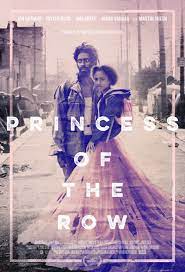
PRINCESS OF THE ROW
US, 2019, 85 minutes, Colour.
Edi Gathegi, Tayler Buck, Ana Ortiz, Jacob Vargas, Jenny Gago, Martin Sheen.
Directed by Van Maximillian Carlson.
The Row of the title is Skid Row in Los Angeles. An Iraq veteran, suffering from brain damage, lives in a tent, erratic in his behaviour, moments of lucidity, moments of violence, dependent on charity and help, eating meals on the ground.
The Princess of the title is Alicia, Tayler Buck, the veteran’s 12-year-old daughter who is meant to be in care, under the caring administration of Magdalene (Ana Ortiz) but who keeps going back to the Row to be with her father. He calls her Princess with reference to a fairy story about a Princess and the unicorn. Alicia has been writing short stories, even winning a local competition, focusing on the Princess and the unicorn.
The film presents a very strong picture of the difficulties of life in the street.
The question comes up about the responsibility of the daughter to her father, Alicia being very serious, avoiding being confined, continually returning to her father, getting food, going walking with him, avoiding the authorities. The film brings home the reality of this relationship and its difficulty quite powerfully.
At one stage, Alicia goes to live with an elderly couple, played by Martin Sheen, always a guarantee of social concern in his films, and Jenny Gago. He is a writer and commends Alicia. However, she steals from him, typing the word sorry, and going back to Los Angeles.
There is a very grim aspect of life on the street, especially sexual trafficking. An earnest man, seemingly of goodwill, gives his card to Alicia and she eventually approaches him, only to find that he is a pimp, prepares her for a client, but she screams and her father responds, bashing the client. However, they take the client’s money, buy clothes, food, go to a motel.
Ultimately, there is a scene where the father reaches out knocking his daughter over, her going to hospital, having to face reality, letting her father live on the street, and the audience seeing him quietly farewelling her, and her return then to the benevolent couple in the mountains.
- Part of the film? The visualising of the Princess and the unicorn, the opening, later when Alicia has to leave her father?
- A film of social concern, American veterans, PTSD, brain damage, race issues, living on the street? The consequences for children, relationship with father, with social services, education, fostering?
- Establishing the situation, the father, the flashbacks when he looked ordinary and telling stories to his daughter, his locks, the injured eye, his erratic behaviour, moments of lucidity, violence? The tent, his needs, sitting on the ground to eat? His daughter, her continued devotion, being with him, walking with him, providing for him? The strong bonds and her memories?
- Alicia, social services, her aunt abandoning her, Magdalene and her sympathy, finding accommodation? John and his wife, the visit, the comment about her short stories, their living 10 hours from Los Angeles, the comfortable home, the welcome to Alicia, his praise of her short stories, the stealing the money, typing sorry and leaving?
- The situation becoming more difficult? Managing her father? The sympathetic man with his card and offer of help? Contacting, his smooth talk, sexual trafficking, the dresses, make up, her agreeing, the ordinary -looking client, her reaction, screaming, her father coming in, bashing the client?
- Their taking the money, the motel, the diner, the food, going to the shop for clothes?
- Magdalene, getting Alicia to school, the school sequence? Her concern about her father, her father and the outburst, her wound, hospital, having to face reality?
- The sad farewell, his new tent on the Row, his realising what was happening, the quiet farewell in private?
- Alicia going to the couple, the welcome, her future?
Cheshire Murders, The
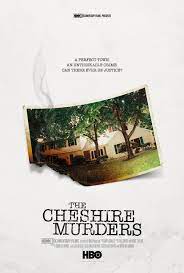
THE CHESHIRE MURDERS
US, 2013, 118 minutes, Colour.
Directed by Kate Davis and David Heilbroner.
A thought-provoking documentary.
The murders took place in Cheshire Connecticut in 2007, a brutal home invasion by two known criminals, the bashing of the father, the sending of the mother to a bank to get ransom money and then her murder, the rape and murder of the two daughters, the setting of the house on fire, the taking of the family car, its crashing and their being arrested. After some years in prison, each of the men was tried and found guilty and received the death penalty.
This is not a crime investigation documentary. It is clear from the beginning what happened. And the men confessed.
The film uses a great deal of archival footage to reconstruct the situation, especially in the latter part of the film going through the events hour by hour. There is criticism of the local police force and their slowness to respond, possibilities of saving the victims. The husband, severely bashed and injured, surviving.
As expected, there are many talking heads and interviews, especially effective the extensive scenes with the murdered woman’s sister. And, there are interviews with her mother and father, he a Reverend. And, throughout, many interviews with the father, a doctor.
And, there are many talking heads on the legal issues, psychiatrists and their opinions of the two men, defence lawyers, prosecutors.
While the audience learns a great deal about the murdered family, family footage, and much sympathy, there is also a great deal about the two criminals, their lives, archival material, photos, their both being abused as children, their psychology, a history of viciousness, even violence – and the brothers of one of the criminals telling of the betrayal history by the brother and their being available to give testimony against him to the police. There is also testimony by this criminal’s daughter, her love for her father, yet her alienation from him. The younger man, the more vicious, is spoken about by some women who dated him in the past.
And, ultimately, this is a film about justice and punishment.
There is great feeling about the death penalty, especially from the surviving husband. However, the film raises the dilemma about life imprisonment and the death penalty, discussions at the time in the state of Connecticut about the abolition of the death penalty, the governor reaffirming it, but, ultimately, the abolition. The dilemma is strongly noted and left to the audience to make up its mind.
If the two men pleaded guilty, they would not have to go to trial, would get a life sentence without parole, there would be no need for trials and for the long processes going over the situation in detail, with the consequent pain for the family. With a life sentence, no public delving into the details of the crimes and the criminals left forgotten in prison.
What happened was that there were preliminary hearings, going to trial, a great deal of evidence, and the photos taken too grim for publication, to be seen only by the juries. This meant that the family had years of living with the trials and the memories of the crime. And, after the jury’s verdict of guilty, the possibilities of appeals and the whole processes going on for years.
The film asks which would have been the best solution for justice and for grief.
Why Didn't They Ask Evans?/ 2009
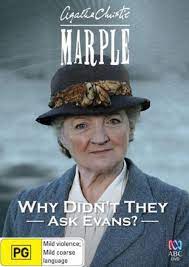
WHY DIDN'T THEY ASK EVANS?
UK, 2009, 94 minutes, Colour.
Julia McKenzie, Sean Biggerstaff, Georgia Moffet, Rafe Spall, Richard Briers, Samantha Bond, Rik Mayall, Natalie Dormer, Warren Clarke, Mark Williams, David Buchanan, Siwan Morris, Helen Lederer, Hannah Murray, Freddy Fox.
Directed by Nicholas Renton.
A Miss Marple television movie – but she did not appear in the original story. While she does make an appearance, listens, analyses, comes up with solutions, the investigating couple, as in the novel and previous film versions, is a young man Bobby Jones and his friend, the rather pushy lady Frankie Derwent.
There are a great number of changes from the original novel and the previous versions. In fact, almost all the significant characters appear in the first 20 minutes. Which means that the basic plot, the main key elements from Agatha Christie, are highly simplified, characters are dropped, and alternate motivation brought out at the end.
Omitted from the original is the fact that Bobby Jones is a golfer, no golf in this film. And, compared with Will Poulter in the 2022 version, he is rather slight in character and behaviour. More than made up for by Frankie, Georgia Moffet. While he plays the organ, he does not live in a rectory with his father the Minister, does not play golf with the local doctor who is murdered, does not encounter the suspicious couple at the inquest, Roger Bassington does not guard the body at the foot of the cliff or change a photo, Bobby does not have a military background, does not go to London to set up a garage with his friend who helps in the search of the mental institution.
Frankie does crash her car, is taken in by the family, continues her investigations, is misled because of a character from China, a botanist, Evans, played by Father Brown’s Mark Williams. Daziell and Pascoe’s Warren Clarke is a bumptious investigator. And, for good measure, Richard Briers is the elderly Butler. Rafe Spall and Natalie Dormer have key roles. Rik Mayall is the doctor, played by Hugh Laurie in the 2022 version which he wrote and directed.
Audiences making comparisons with the novel will be disappointed and a touch bewildered. Otherwise, it is an Agatha Christie-like television film incorporating some of her elements.
- Popularity of Agatha Christie stories? Miss Marple? The three actresses for Miss Marple?
- Comparisons with the novel, change of situations, dropping of characters, compressing of plot, change of motivations, solution?
- The setting, the cliffs, home, the finding of the body, Bobby, his reaction, the dying man’s question? With his mother, the inquest, the mysterious cousin present?
- Bobby as a rather more retiring character, playing the organ, his injuries and reluctance to travel? The past friendship with Frankie, bonding with her, her forthrightness? Miss Marple, her arrival, the past connection with the family, memories of Bobby?
- Frankie, going on, driving the car, crashing the car, gatecrashing the household, the butler helping her, Sylvia welcoming, Tommy and Dottie the strange presence, Roger at the piano, the commander and his presence, attraction to Sylvia, the doctor, seeming attraction to Sylvia, story about his wife, Moira? Frankie, investigating, the phone calls to Bobby?
- Bobby, going to London, making enquiries, John Savage, Carstairs, the will? His coming to Castle Savage as the chauffeur?
- Miss Marple, gatecrashing, saying that she was Frankie’s nanny, reassuring Frankie, explaining the direction of the crashed car? Her presence in the household, observing?
- The household, Sylvia, the drugs, her erratic behaviour? Alienation from her children? Dottie, forthright, intruding? Tom, the snake, retiring? Roger, musician, allegedly teaching music? The commander and his background? Evans, from China, the orchids? The red herring with his name Evans? His being murdered?
- The story of John Savage, his portrait, a harsh father? Relationship with Sylvia? The revelation about the past, Sylvia and her relationship with George, the children, the disappearance, marrying John, her unhappy life, the second group of children?
- The doctor under suspicion, Bobby attacking him, to the Institute? The revelation of the truth, supplying drugs to Sylvia? Moira as his nurse, marrying her? Her suspicious and erratic behaviour, in the grounds, observed by Frankie? Her attraction towards Bobby? Frankie and the attraction towards Roger?
- The issue of the Will, the background of China, the two brothers in China, the orphanage, Sylvia wanting the money to go to the orphans, reparation, for them to be happy?
- The changing of the Will, the murder of John, Roger posing as John, the new gardeners signing, the importance of not having the maid as a witness, her knowing Roger?
- The climax, Tommy shooting Roger, Miss Marple telling the story, Moira about to poison Sylvia, the syringe, the butler getting it and injecting it in Moira?
- And the final revelation, the maid in Bobby’s house, her marriage, honeymoon, and her being Florrie Evans?
Last Survivors/ 2021
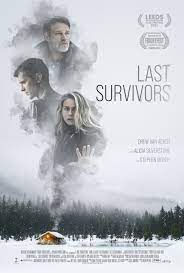
LAST SURVIVORS
US, 2021, 98 minutes, Colour.
Drew Van Acker, Alicia Silverstone, Stephen Moyer, Mark Famiglietti.
Directed by Drew Mylrea.
The title has overtones of the apocalyptic experience in world. And, that is how it begins.
A father and son have taken refuge in the wilderness, the father explaining that there had been the experience of World War 3, the man and the loss of his wife, their having to take refuge and build themselves at home to survive. And this has happened for 20 years, the father, Stephen Moyer, and a strong influence on his son, now grown up, Drew Van Acker.
The father is a strong personality, dominating his son but underestimating the curiosity of the son as he has grown older, living the primitive survival life, hunting killing and storing, with some of the remnants of past mod cons, including some magazines. His father’s order is that any human seen has to be killed and the son tells a hunter.
However, the drama is about the son being curious, venturing beyond the boundaries of the wilderness, seeing a woman at home at a washing line (Alicia Silverstone), returning, curious, questions, even a sexual encounter.
In the meantime, the audience discovers that there was no World War 3, that everything has been going on as normal for 20 years, the police precinct, and diner, plenty of traffic in the streets…
The drama is in the challenge to the son, questioning his father, questioning the woman, misinterpreting a sequence where she is accosted by her former husband who wants her to return to the city which she has abandoned.
Ultimately, the father realises what has happened, tries to intern his son. However, he escapes, build up to a confrontation of the house, involving the woman, and the son having to make decisions.
- Title and expectations? Post-apocalyptic?
- The settings, the woods, Montana? The town, homes, streets and cars, the police precinct, diners, business? The musical score?
- The opening, the frontier, father and son, over 20 years, father raising his son to be independent, hunting, storing, surviving? World War 3, everyone the enemy? Weapons, fighting? The bond between father and son? The setup, the house, storing, hunting and killing, skinning the animals…? Remnants from the past, the magazines? The son not having memories? The absent mother?
- The son, his age, the mission, confronting the hunter, seen as the enemy, death?
- The son, wandering further than the boundaries, his father urging him to kill anyone seen, the woman at the clothes line, his observing, not killing her, telling his father he had?
- The tension between father and son, the son and his questions, suspicions, returning?
- Henrietta, her house, the background, her leaving her family, mental health, medication, her husband coming to seek her, demanding her return?
- Henrietta, the encounters with Jake, talking, his being tentative, her hearing his stories about the World War 3, her trying to reassure him? The sexual encounter and its effect?
- Jake, returning to the town, seeing the cars, people ordinary, no sign of World War?
- His father, suspicious, confining his son, the son’s escape?
- Seeing Henrietta at the diner, with the man, his suspicions, accosting him? The consequent violence?
- The buildup to the confrontation between father and son, the father, his motivations, the police officer and his looking at the records, his father’s behaviour, the reason for the retreat?
- Father and son, violence and death, the sums future? And Henrietta?
Why Didn't They Ask Evans?/ 2022
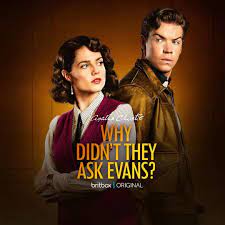
WHY DIDN'T THEY ASK EVANS?
UK, 2022, 174 minutes, Colour.
Will Poulter, Lucy Boynton, Maeve Dermody, Daniel Ings, Jonathan Jules, Alistair Petrie, Morwenna Banks, Richard Dixon, Nia Trussler Jones, Miles Jupp, Amy Nutall, Hugh Laurie, Conleth Hill, Thompson, Jim Broadbent.
Directed by Hugh Laurie.
Why Didn’t They Ask Evans? was one of the first Agatha Christie mysteries to be adapted for television at the beginning of the 1980s. It led to 70 full-length or short films with David Suchet as Poirot, to a series of Miss Marple stories starring Joan Hickson, then Geraldine McEwan, then Julia McKenzie. And it led to various Agatha Christie novels being turned into television miniseries (and some substantial criticism that they veered too far away from the plot sometimes of Christie’s work.
This version is one of those miniseries but works quite well, keeping very close to the original novel, thanks to the adaptation for the screen by actor, Hugh Laurie, who also directs and has a role as the doctor at the institution.
The series is a star vehicle for Will Poulter, former child star, as the central character, Bobby Jones. And he is matched by Lucy Boynton, as lady Frankie Derwent (and Hugh Laurie has persuaded friends Emma Thompson and Jim Broadbent to have cameos as her eccentric parents).
Bobby Jones finds a dying man at the foot of the cliff – and his final words: why didn’t they ask Evans? Bobby Jones’ character is well developed, son of the local Minister, playing golf with the local doctor who is murdered, military background, looking for a place in life, including a garage with his friend in London.
The bulk of the film consists of Bobby and Frankie doing the detective work, unmasking a couple who turned up at the inquest claiming to be cousins, finding out the identity of the dead man, Frankie engineering a car accident outside a mansion associated with a millionaire who has committed suicide and ingratiating herself with the family, the audience finding a group of eccentrics. There is also a mental institution nearby, a focus on the erratic behaviour of the doctor’s wife.
Ultimately, there is a great deal of menace, people being trapped in the institution, escapes, final confrontations – and the working out of the dead man’s question which concern the signatures to a will.
Agatha Christie fans will be more satisfied with this interpretation of her novel rather than a simplified and modified 2009 version.
- The popularity of screen versions of Agatha Christie novels?
- Written and directed by Hugh Laurie, his cameo role?
- Originally a story without Miss Marple, her being brought into the story, links with Bobby Jones, with Frankie? Contribution to the solution?
- The solution, Bobby playing golf, his military background, his Minister father, his reputation, return home, prospects, life at the rectory? Seeing the man, going down, the last words? His death? The photo of the woman in his pocket? The presence of Roger, keeping guard on the body? Later complications?
- The inquest, Amanda and Leo Cayman, identifying the body, the link with the man? Amanda not appearing like the photo? And the death of the doctor?
- The introduction to Frankie, family background, the visit to her eccentric parents? Knowing Bobby, the bond with him, their working the case together? The poison attempts on Bobby? The prospect of a job in Argentina, failure? His going to London, his friend, the garage? The puzzle about the different photo? Suspecting Roger changed the photo? Suspicions on the Caymans?
- Frankie and Bobby staging the accident, Frankie taken in, been made welcomed by Sylvia, the erratic behaviour of her husband, her son? Identifying Carstairs, the story about John Savage?
- Dr Nicholson, his Institute, his experiments, mental health, the patient’s? Suspicious? Moira are his wife? Bobby, secretly doing the investigation, with his friend? Moira, the mystery? The sinister presence and attempts of their life, imprisoning them? And the death of Henry?
- Frankie, going to the lawyers, identifying Carstairs, his story, the story of John Savage, dying of cancer, at the Institute, his suicide? His will? Leaving his money to the Templetons?
- Roger, his violence and the attacks?
- The background to the writing of the Will, Savage, Hugo in disguise, the witnesses to the writing of the will? Not asking Evans because she could have identified the real John Savage? The irony of her being the maid at Bobby’s father’s rectory?
- The solution, the complications, happy romantic ending?
Ghosts of Abu Ghraib
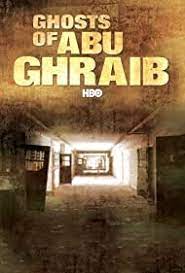
GHOSTS OF ABU GHRAIB
US, 2007, 78 minutes, Colour.
Directed by Rory Kennedy.
This film made an impact, especially in the United States, in 2007, only a few years after the events that it portrays. A year later, prolific documentary maker, Alex Gibney, made the Oscar-winning Taxi to the Darkside, expanding the themes of Ghosts to incorporate not only the torture of Iraqi prisoners in Abu Ghraib, but extending to the experiences Guantánamo Bay and Bagram Airport.
In later years, there are a number of films about American torture of prisoners including Rendition, moving prisoners from country to country, Zero Dark 30, interrogations and the taking of Osama bin Laden, The Mauritanian and a focus on Guantánamo Bay. For an understanding of the positions taken by the Bush administration, by exposes, and by diligent research, the film to be recommended is The Report with Adam Driver and Annette Bening.
On the one hand, a number of officials of the American administration are incorporated into this narrative, including George Bush, moments of Dick Cheney, some speeches by Donald Rumsfeld, there are spokespersons who explain the post-2001 interpretation of the Geneva conventions, especially that they did not apply to terrorists. There are also details about types of torture.
However, Incorporated are quite a number of photos taken of the torture and some video clips. And photos not been taken and brought to public and media notice, then might not have been any investigation or expose.
But, the main speakers in the film are military personnel who were assigned, without training, to Abu Ghraib, Saddam Hussein’s of prison and torture centre, to work with the prisoners, all of them giving a personal impression of what they saw, what they did – and the information that most of them served prison terms. This included a Brigadier General – the highest rank officer who was demoted. On the contrary, the higher officials who administered the regimes with torture were honoured.
The film opens with some sequences from the Stanford 1961 experiments by Dr Milgram, testing the obedience of those directed to administer torture, finding that they did obey instructions and applied the torture (actually an actor impersonating the effects of the torture but they did not know this). And the film returns to this era at the end.
This film was released soon after the events, championed by those against torture, condemned by those who felt that was undermining American authority in the war against terror.
Living with Lincoln
LIVING WITH LINCOLN
US, 2015, 70 minutes, Colour.
Directed by Peter Kunhardt.
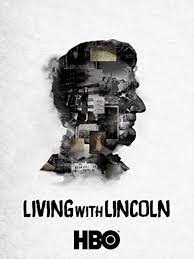 For anyone wanting to know more about President Abraham Lincoln as well as to see myriads of photos of him, this is 70 minutes well spent.
For anyone wanting to know more about President Abraham Lincoln as well as to see myriads of photos of him, this is 70 minutes well spent.
The film was directed by Peter Kunhardt, prolific documentary producer but also director of significant documentaries on American politics, Nixon in his own Words, King in the Wilderness, a portrait of John McCain and a three part series on President Obama. He is aided in the production by members of his family.
The director is very much involved because this is a family story. It goes back to the Civil War, where the director’s great-grandfather served on the Union side and wrote a diary. However, he was affected by the war, abandoned his family and became a travelling preacher. However, his son, Frederick Hill Meserve, eventually tracked down his father and worked with him on preparing the diary for publication. Meserve himself became an enthusiast about Lincoln and decided to track down as many photos of the President as he could. This documentary shows his quest and the extraordinary number of photos that he was able to discover, acquire, preserve. (He was born in 1865 and died in 1962.)
His daughter, Dorothy, who is married name was Kunhardt, shared in her father’s enthusiasm and decided to investigate the life of Lincoln, his wife and children, again collecting an enormous amount of material, including buying all the books that remained from the Lincoln household.
The work was difficult for Dorothy because she suffered from depression, bringing up her children, marrying into wealth (her in-laws disapproving) but her husband losing his money in business during the Depression. Dorothy was always interested in telling children stories and began to write them, illustrate them, even have a device where children could interact with the books (illustrations covered, holes in pages…). This aspect of Dorothy’s work is a story in itself.
While the family story has its exhilaration as well as that sadnesses, this telling of the story of the director’s great-grandfather and grandmother, is interesting and entertaining but it does open up many reflections on Abraham Lincoln, the character of Mary Todd and her relationship with her husband, and the four sons that they had.
The whole collection of text and photos was acquired by Yale University in 2015.
Drought/ 2019

DROUGHT
US, 2020, 84 minutes, Colour.
Owen Scheid, Hannah Black, Meagan Petersen, Drew Scheid.
Directed by Hana Black and Meagan Petersen.
A family drama. A humanitarian film.
This is also a film that focuses on autism and men and women on the spectrum. The central character, Carl, is autistic, one of those savants with a specialisation, this time the weather and his desire to chase a brewing storm. His played by Owen Scheidt, his first film role. Owen Scheid is autistic himself and there are a number of interviews available with him about what it meant for him and his own experience on the spectrum and portraying it on screen.
The film is brief, and initial introduction to the family, very unsympathetic mother and father, a sister at home who is concerned about her brother. They both work in local supermarket but, Carl with his exact interpretation and literal interpretation of everything, falls foul of a woman who refuses to return her supermarket trolley. He struggles, she falls, and he is fired.
In the meantime, an older sister who has left the town long since, is urged to return by their mother to keep an eye on the family.
Then this becomes a road film, Carl and his sisters in a former ice cream van, and a friend of Carl’s, Lucas (played by Owen Scheid’s actual brother, Drew Scheid), rather carefree, along for the ride.
A lot of the drama is the interactions, especially between the two sisters. There is also Carl’s intensity about finding the storm, the demands of continuing, the repercussions of stopping on the way, some complications at a motel.
Ultimately, it might seem that Carl is made a mistake about the storm – but, eventually he has proven right.
The film was made in North Carolina, on a small budget, some crowdfunding by locals, and the film written and codirected by Hannah Black and Megan Peterson who also play the two sisters.
(For an interesting film interpretation of autistic experience, knowledge and understanding, storing and interpretation of information, the film Temple Grandin, with Clare Danes, is a significant contribution.)
- The title? Weather and storms? Emotional drought?
- The North Carolina settings, homes, town, on the road, motels, the countryside, the storm? The musical score?
- The family, the parents, treatment of Sam, treatment of Carl? The story of their arrest?
- The focus on Carl, autism, his age, self-presentation, at the supermarket, his insistence on the rules about the trolleys, hitting the girl, his being fired? Sam, at work, the boss, promising to tell Carl? Her not doing so? Back at the supermarket, the scene?
- Lillian, long absence, her return, the mother’s phone call, tension with Sam?
- Carl, knowledge of the weather, expertise, taking notes, observing, writing? Wanting to go to search for the storm? Lucas turning up, friend? The ice cream truck? Lillian and her reluctance? Going on the journey?
- The interactions between the two sisters, memories, bitterness, fought on both sides? Carl and his relationship with them? Lucas, his presence in the van, cheerful?
- Carl, expertise, taking everything absolutely literally, wanting to stop for food, demanding? The issue of the petrol, intending to steal the petrol, Carl and his finding the friendly man, the friendly man and his urging peace?
- Carl, wanting his own way, the smashing of the camera? The apology through the old man?
- The motel, staying the night, the tough stances of the proprietor, bargaining about prices? The two rooms? Sam and Lucas, the conversations? Her going out, the encounter with Nick and the conversation? Lillian finding her, the criticism?
- Waking up, late, Carl missing, getting the keys back, searching for Carl? His explaining the situation to the young woman? The reactions of the sisters?
- Continuing, or turning round? Carl and his calculations? The decision to go forward, to find the storm?
- And some peacefulness after the family storms?
End of the Road/ 2022
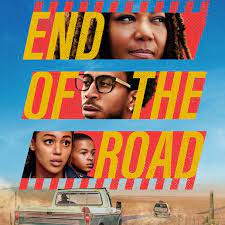
END OF THE ROAD
US, 2022, 89 minutes, Colour.
Queen Latifah, Chris Bridges (Ludicris) Mychaela Lee, Shaun Dixon, Beau Bridges, Frances Lee McCain.
Directed by Millicent Shelton.
As can be seen from the title, this is a road movie.
We are introduced to a family, the father having died, the mother having to take her two children on the road, cross-country, especially Arizona, to stay with her sister. A scene at the beginning, the two children are moody, the young boy with his computer games, the teenage girl listening to music, rather sullen, unwilling to move. There is also the mother’s brother, Reggie, something of a ne’er-do-well, unreliable. The mother is played by Queen Latifah, Reggie by Chris Bridges (Ludicris).
The early part of the drama is getting everyone to talk to one another. Some progress and they stay for a night at a motel. However, the hear a shot, and a man is killed in the adjacent unit, Render trying to help with her training as a nurse. They are interrogated by the police and move on.
However, the audience has been introduced to a sequence, a drug dealer from the cartels flying in on a helicopter, a bag of money, and one of the recipients shooting the other. The audience sees that the dead man is the one who did the shooting at the helicopter.
However, the chief of police, Beau Bridges, declares his determination to capture the mastermind whom he has been pursuing for a long time.
The family stop at a Wild West Theme Park, enjoying it, but receiving phone calls from a mysterious voice about the bag of money that had been in the motel (and which Reggie had taken, a guarantee for the family). Then the action starts, the young boy is abducted, Brenda has hidden the money at a motel and returns to get it, sees that one of the cleaners has taken it, pursues her, gets tangled with a supremacist group but turns the tables, still with the mysterious phone calls. The police chief has rescued Reggie and the daughter.
Then, of course the revelation, the twist, and the violent confrontation between the family and the killer.
It ends well for the family – and, a moral issue, while most of the money was seen to be burnt up in a car and flames, Reggie has pocketed some of the money.
- A road movie? The dramatic end of the road?
- New Mexico settings, homes, moving home, the desert countryside, the motel, the police questioning, the wild West setting, the sheriff’s house? The musical score?
- The situation, Brenda, widow, the two children, self-centred, petulant, the move? The drive, no conversation, commanding them to speak and listen?
- Reggie, his background, unreliable, drugs, confidential conversations with Kelly? Relationship with Brenda, his place in the car?
- The sequence with the helicopter, the rendezvous with the men, drugs, cartels, the bag of money, the accomplice shooting the other?
- The motel, the rooms, hearing the shot? The dead man? Brenda using her nursing skills? His death, the police, the interrogations? Brenda in the family moving out, the phone calls from Hammers, his authority, coming to meet them? The man the accomplice with the helicopter?
- Reggie, seeing the bag of money, taking it, naïvely hoping that it will solve the family future?
- Going to the wild West show, the various personalities, the saloons, the prison, the youngsters enjoying it, the high noon?
- Hammers, his authority, the other police, the interrogations, the name of the arch criminal, his alleged search for him?
- The film turning violent, the abduction of the sn and internment? Brenda, concern, the phone calls, the hiding the money in the motel, the irony of the worker taking it, Brenda seeing her, pursuing her in the car, the crash, the American patriot group, holding Brenda, her turning the tables, the gun, the shot, her getting away, desperate?
- Reaching Kelly, taken, the house? Hammers and his wife, tough stances? The revelation of the truth? The phone calls?
- The escape, Brenda and the crash, trying to get to the house, the family United, Hammers and his pursuit, confronting them, the shooting?
- Hammers and his wife, violent, the tables turned, the shootings, the fire? Death?
- The family that is threatened together stays together – the motel scene, the audience having seen the bag of money go up in fire, yet Reggie keeping some of it…?
Apex

APEX
US, 2021, 93 minutes, Colour.
Neal McDonough, Bruce Willis, Cory Large, Alexia Fast, Lochlyn Monro, Nelson Lennarson, Megan Peter Hill, Trevor Gretsky.
Directed by Edward Dake.
Apex, also called Apex Predator, is based on the famous and popular short story of 1924 by Richard Connell, The Most Dangerous Game. It was filmed in 1932 and there have been many variations of the plot since, including a 2022 version with the same title stirring Tom Berenger.
The opening introduces us to a completely ruthless hunter, Rainsford, Neal McDonough, respectable but, as we learn and he has murdered his wife. He belongs to a group of hunters, wealthy elite men (and one woman) who pay fees to go to Apex island in order to hunt. They pay big money for human prey. The organisers suggest that an effective prey would be a former policeman, Malone, who has been in isolation for seven years. He is played by Bruce Willis in the style of his many, very many, action shows since the 2000s.
The film was shot in British Columbia, forest sequences, and a lavish headquarters where the hunters can return to. There are many conversation scenes, business rivalries, competitive attitudes. And Malone is released as their prey. Needless to say, he often gets the better of them. But, the rivalries between the hunters takes over, one wounded by Malone then killed by a rival hunter. Rainsford seems supremely superior to everyone and he to kill his rivals.
Ultimately, there is the expected elimination of most of the hunters and a buildup to a confrontation, verbal and violent between Rainsford and Malone.
The film was not particularly well received, even amongst Bruce Willis fans who, by this stage of his career, just before his having to retire because of aphasia, who felt that he was accepting any part without discrimination.